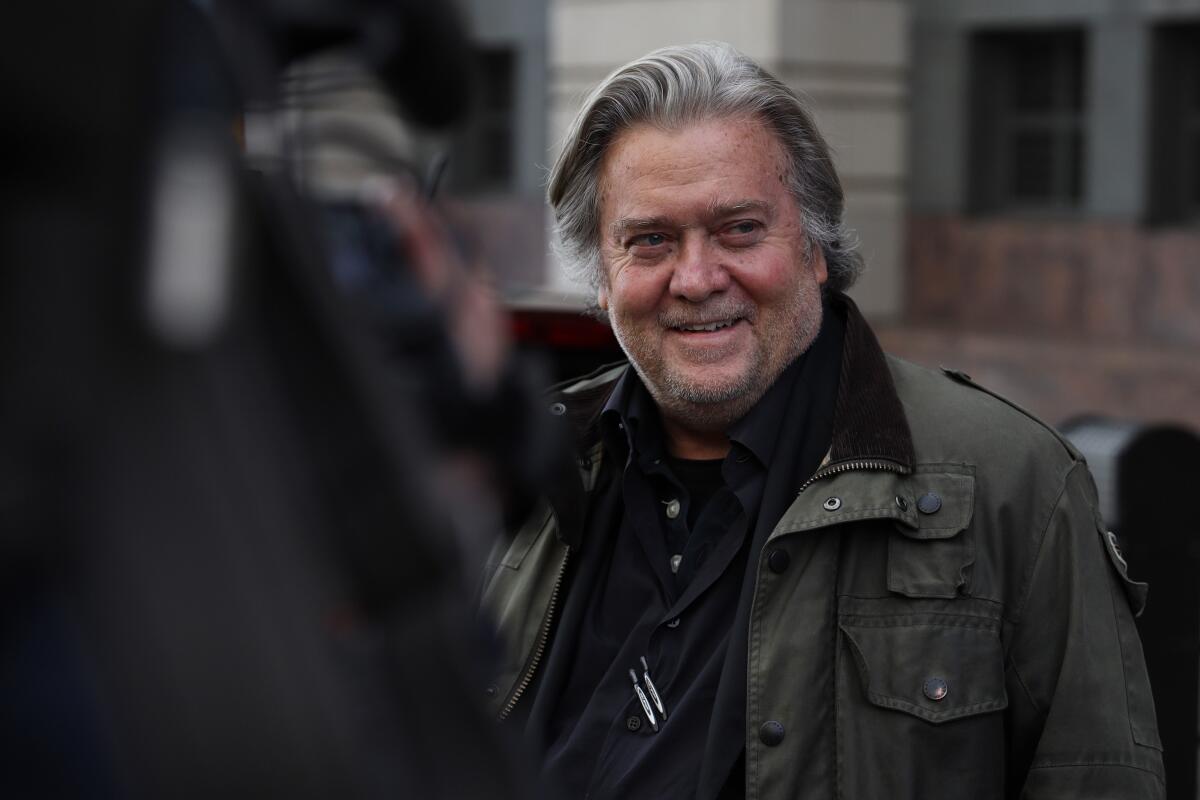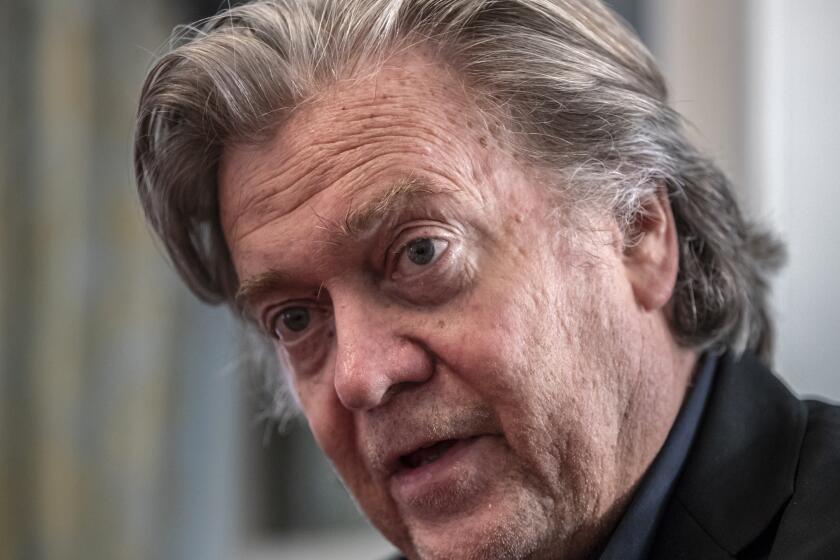Column: Don’t be too sure about the Justice Department’s ‘duty’ to indict Bannon

- Share via
Atty. Gen. Merrick Garland has a far more complicated decision coming his way than people realize.
The Department of Justice, in the person of the United States attorney for the District of Columbia, has received a referral from the House of Representatives to bring criminal contempt charges against Stephen K. Bannon, who has refused to comply with a subpoena from the House select committee investigating the events of Jan. 6.
The righteousness of the referral is not in doubt. There is every reason to think Bannon has important first-hand information about the planning of the Capitol attack. After all, he crowed the night before on his podcast: “All hell is going to break loose tomorrow…. Strap in.”
In addition, as the committee’s vice chair, Rep. Liz Cheney (R-Wyo.), emphasized Tuesday, there is strong reason to think Bannon knows if and how Trump was “personally involved” in the Jan. 6 attack. No matter is more important for Congress to probe or for the American public to understand.
As for Bannon’s thumbing his nose at a subpoena, it could not be a more flagrant or a more contemptuous violation of the law.
The House vote sends the matter to the U.S. attorney’s office, which will decide whether to present the case to a grand jury for possible criminal charges.
Under the statute that governs contempt referrals, once Congress has found someone in contempt, it is the “duty” of the United States attorney “to bring the matter before the grand jury for its action.”
So what happens next should be a slam dunk, right? But it isn’t.
As it turns out, the Department of Justice has emphatically pushed back against contempt referrals related to the executive branch.
The Office of Legal Counsel, the DOJ’s legal advisor to the president, is responsible for opinions that will cast a large shadow on Garland’s decision. Remember that certain legal counsel memos, including these, are binding on the executive branch. (One such memo, which concluded that a sitting president couldn’t be indicted, drove Robert S. Mueller III’s declining to determine whether Trump obstructed justice.)
One of the pertinent legal counsel memos holds that, notwithstanding the mandatory language of the statute, the Justice Department retains its traditional prosecutorial discretion over contempt referrals. In other words, there is no more “duty” to go to a grand jury than in any other case.
Two more memos, from 1980 and 2008, are yet more significant and on point. They hold that the DOJ “may not” prosecute criminal contempt charges against a current or former White House official who ignores a congressional subpoena based on an assertion of executive privilege. “As a matter of statutory interpretation and the constitutional separation of powers,” the reasoning goes, the statute was not intended to, and could not lawfully, apply to such contempt claims.
And indeed, since the 1980s, the DOJ has rejected a long list of criminal contempt referrals that turned on executive privilege. For example, Congress referred Obama administration Atty. Gen. Eric H. Holder Jr. for criminal contempt during the Fast and Furious investigation, but the department declined to go forward.
In those cases, of course, it was the sitting president who asserted executive privilege. President Biden has made it clear that he is not going to invoke the privilege as regards the Jan. 6 investigation, but here too Garland faces a complication.
In 1977, in the Supreme Court case Nixon vs. General Services Administration, the decision acknowledged that even former presidents could assert executive privilege. Although President Trump hasn’t formally done that — the lawsuit he filed asserts only that there is a need to straighten out whether he has such a privilege — Garland is unlikely to disregard the 1977 Supreme Court language in his deliberations.
For Garland, then, the Bannon referral sits at the seam joining two guiding principles: Return the Justice Department to compliance with set policies and norms after years in which they were shredded, and respond aggressively to the storming of the Capitol, which Garland has called a “heinous event.”
There is a way for Garland to square the circle. The Office of Legal Counsel’s memo that has precluded pursuit of criminal contempt charges was based on cases in which the department issued legal opinions that the assertions of privilege were proper.
Bannon’s suggestion that the subpoenaed documents and communications are properly covered by executive privilege is spurious at best. First, there’s the fact that Trump hasn’t actually asserted the privilege. On top of that, the select committee’s subpoena involves events that happened years after Bannon left the executive branch; it’s ridiculous to say the relevant testimony and documents must be kept secret to ensure that presidents can freely do the country’s business.
Finally, even if Bannon had a sound claim to executive privilege, Congress’ and the public’s need to know the information covered by the subpoena is paramount, and that factor should prevail. (Likewise, public interest trumped Nixon’s claim to privacy in the 1977 Supreme Court case, which was about the disposition of the disgraced president’s papers.)
Garland has proved to be a cautious, process-oriented attorney general, and one dedicated to justice. The Office of Legal Counsel memos and the Supreme Court’s language in Nixon vs. General Services Administration guarantee an ultra-thorough decision-making process that weighs all the considerations raised by the Bannon contempt referral.
Bannon deserves to be convicted of criminal contempt. But we shouldn’t assume we know which way Garland will go.
More to Read
A cure for the common opinion
Get thought-provoking perspectives with our weekly newsletter.
You may occasionally receive promotional content from the Los Angeles Times.












